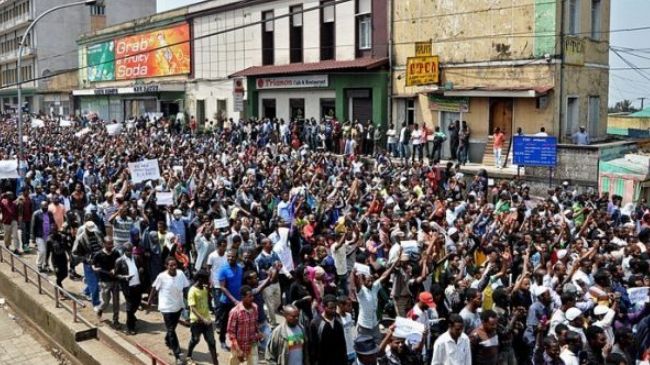Several thousand Congolese demonstrators tried on Wednesday (15 June) in Goma to cross the border with Rwanda, accused of supporting the M23 rebellion in the eastern Democratic Republic of Congo (DRC).
Demonstrations against Kigali and in support of the Congolese army are continuing in the DRC. Yesterday morning, several people in Goma headed towards the Rwandan border. They sought to cross the barriers that separate the two countries to express their anger at the “Rwandan aggression.”
“The Congolese population wanted to cross the border with neighbouring Rwanda to show the regime in Kigali that they are not afraid to confront it and are fed up with Rwanda’s hypocrisy in diplomatic relations with the DRC. It accuses it of supporting M23 terrorists, a rebel movement that was defeated in 2013 by the armed forces of the Democratic Republic of Congo,” Victor Muhindo, a journalist based in Goma told APA.
“The situation has been calm since the beginning of the afternoon. But because of this march initiated by civil society to support the DRC armed forces, at the front against the M23 supported by Rwanda and Uganda, according to the Congolese government, the atmosphere resembled a dead city as socio-economic activities remained paralyzed all day,” he added.
Scenes of looting
On Wednesday, scenes of looting of shops belonging to Rwandan nationals were observed in a commercial district, according to several witnesses. In the city, banks, gas stations, schools, shops and other businesses were closed, except for some pharmacies. In the panic, Rwandan nationals in the town fled across the border into Rwanda, while Congolese on the Rwandan side did the opposite.
On some roads, demonstrators stopped and searched vehicles, demanding to know the identity of their occupants. Verbal threats against people considered “Rwandophones” because of their appearance were also reported by AFP. “We don’t want any more Rwandans, let us go and confront (President Paul) Kagame at home,” protesters shouted. But they were dispersed by riot police as they tried to force their way into Rwanda. At least one person was injured, according to AFP.
For more than two decades, Rwanda has been singled out for its “involvement in the destabilisation of the eastern part of the DRC,” particularly the North Kivu province, where the rebels of the Democratic Forces for the Liberation of Rwanda (FDLR) have taken refuge. They are mostly Rwandan Hutus accused of massacring Tutsis during the 1994 Rwandan genocide. Kigali considers them a threat even though it denies accusations of supporting the Congolese M23 rebels.
Rebels took the town of Bunagana
A Tutsi-dominated rebellion defeated in 2013 by Kinshasa, the M23 or “March 23 Movement” took up arms again at the end of 2021, reproaching the Congolese authorities for not having respected an agreement for the demobilisation and reintegration of its fighters. If the Angolan president Joao Lourenco was recently appointed by the African Union (AU) to lead the mediation in this crisis involving Rwanda, the tension is higher in the east of the DRC.
On Monday, the Congolese town of Bunagana, an important trade centre on the Ugandan border, fell into the hands of the rebels. The Congolese army accused Rwanda of “invading” its territory.
In a statement issued on Tuesday evening, the Congolese government hardened its tone by condemning “the participation of Rwandan authorities in the support, financing and arming” of the M23 rebellion. “We will defend every inch of our territory,” added the statement released by the Ministry of Communication, the day after the M23 rebels took Bunagana.
For the moment, President Félix Tshisekedi is still silent while several of his compatriots continue to demonstrate, calling for a diplomatic break with Kigali. The Rwandan ambassador Vincent Karega had already been summoned in early June to receive a “severe” warning from the Congolese government.
ODL/cgd/lb/abj/APA


